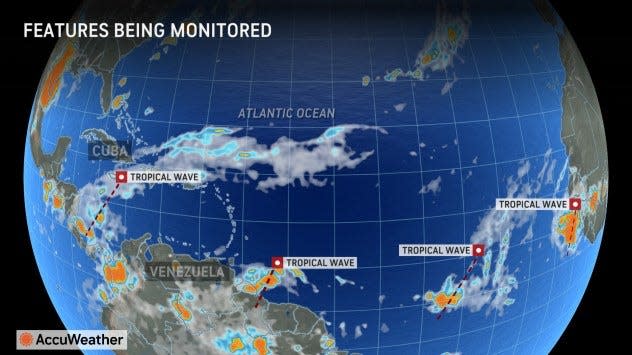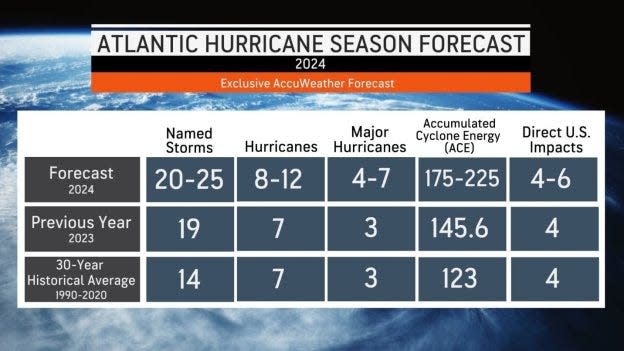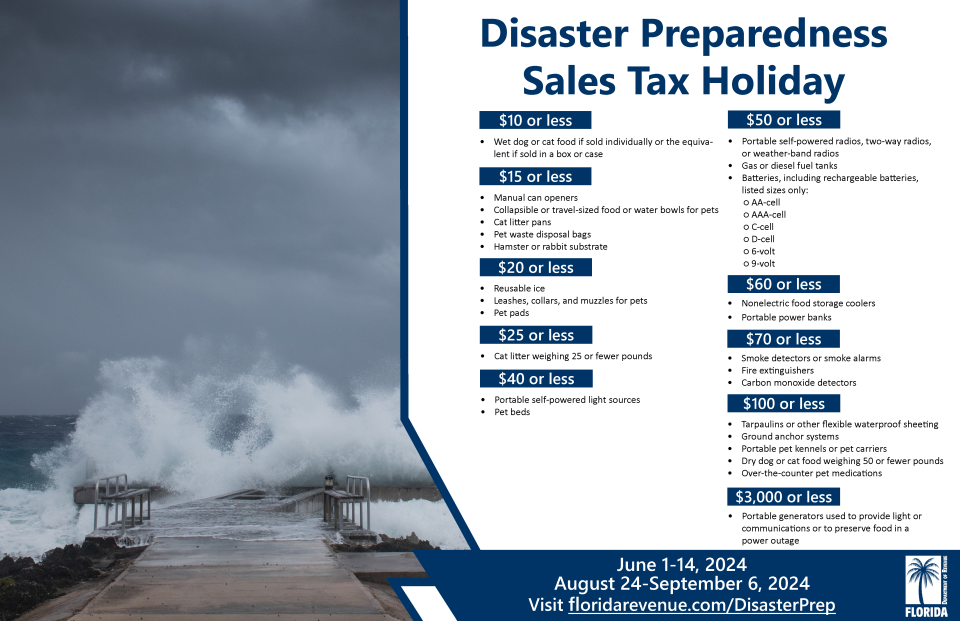AccuWeather forecasters are tracking a “potential tropical threat” in the Caribbean days before the official start of the 2024 Atlantic hurricane season.
Forecasters are watching an area from the northern Caribbean into the southwestern Atlantic.
There’s a 10 percent to 15 percent of the system developing into a tropical system next week. Even if it does, it is not expected to impact the United States, AccuWeather said.
Hurricane season begins Saturday, June 1.
Here’s what you should know about the potential for development of the system being monitored in the Caribbean and tropical waves across the Atlantic basin.
What are AccuWeather forecasters watching in Caribbean?
The area forecasters are watching for potential tropical development extends from part of the northern Caribbean across the central islands of the Caribbean and into the southwestern Atlantic.
A tropical wave is interacting with clouds, showers and thunderstorms in the area, but there are no signs of any tropical development, AccuWeather said.
Could the system in Caribbean strengthen into tropical storm?
“The area of interest we are looking at may not evolve until well into the first week of June — the period from June 4-6 to be exact,” AccuWeather Lead Hurricane Meteorologist Alex DaSilva said.
A disturbance is expected to move across the eastern part of the Gulf of Mexico during the first week of June.
“There is a remote chance it could initiate a tropical depression or more in this area,” said Paul Pastelok, AccuWeather lead long-range meteorologist.
The system will be battling wind shear, which helps prevent tropical systems from developing or strengthening.
If wind shear drops off in the area, it could develop tropically DaSilva said.
Water temperatures play an important role in the development of tropical cyclones.
“Water temperatures are not super warm in the region northeast of the Bahamas, but they are warm enough to support a tropical system,” DaSilva said.
Could a tropical system impact Florida?
The system has a very short window of development, and may not fully turn into anything next week, Pastelok said. “Even If it does, the steering flow would take it over the ocean.”
Steering breezes are expected to take it to the northeast of the southern Bahamas and the Turks and Caicos and then into the central Atlantic.
Who could be impacted by system in the Caribbean?
While AccuWeather expert meteorologists said the threat of direct impacts to the United States is minimal at this time, they are concerned about potential impacts in the Caribbean.
“Even if this system fails to develop into a tropical depression or storm, it will deliver a substantial amount of rain on Hispaniola and some of the other islands in the northern Caribbean in the coming days,” DaSilva said.
‘Making us nervous’: Conditions more favorable for tropical development mid- to late June

Later in June, starting with the second week and extending toward the end of the month, conditions will start to favor tropical development, Pastelok said.
“There’s a lot of moisture covering all of the Caribbean, southern Gulf of Mexico and southwestern Atlantic,” Pastelok said. “It may be just showers and thunderstorms but we’re watching carefully.
“Waters are so warm it won’t take much for something to go. It’s making us nervous.”
Alberto will be the first named storm of Atlantic hurricane season
The first named storm of the 2024 Atlantic hurricane season will be Alberto.
The first named storm typically forms in mid-to–late June, the first hurricane tends to form in early to mid-August, and the first major hurricane forms in late August or early September.
The average season has 14 named storms but every forecast for this year’s season is calling for almost double — or more than double — that number.
AccuWeather predicting ‘super-charged’ hurricane season

AccuWeather is predicting this season has the potential to break the all-time record of 30 named storms in one season.
-
20-25 named storms
-
8-12 hurricanes
-
4-7 major hurricanes
-
4-6 direct U.S. impacts
Rapid intensification of tropical cyclones could increase US dangers
AccuWeather has raised concerns about multiple threats to the United States and the likelihood that some storms may rapidly intensify as they approach land, adding to the danger.
DaSilva warned families, businesses, and government leaders that rapid intensification of tropical cyclones could give people less time to react and evacuate.
Rapid intensification is the term used to describe tropical storms and hurricanes that grow stronger over a short period of time.
Rapid intensification happens when a storm’s maximum sustained winds strengthen by more than 35 mph over a 24-hour period.
Be prepared, don’t let your guard down
AccuWeather expert meteorologists are warning people along the Atlantic and Gulf of Mexico coastlines to not let their guard down or let severe weather fatigue set in.
Now is the time for families and businesses to prepare for hurricane season.
Florida sales tax holiday could help you save money on disaster supplies

Florida will have two, two-week sales tax holidays to help residents prepare for disasters.
The dates are:
-
June 1-June 14
-
Aug. 24-Sept. 6
Eligible items included in the tax-free holiday include:
-
A portable generator used to provide light or communications or preserve food in the event of a power outage with a sales price of $3,000 or less.
-
A tarpaulin or other flexible waterproof sheeting with a sales price of $100 or less.
-
An item normally sold as, or generally advertised as, a ground anchor system or tie-down kit with a sales price of $100 or less.
-
A smoke detector or smoke alarm with a sales price of $70 or less.
-
A fire extinguisher with a sales price of $70 or less.
-
A carbon monoxide detector with a sales price of $70 or less.
-
A nonelectric food storage cooler with a sales price of $60 or less.
-
A portable power bank with a sales price of $60 or less.
-
A gas or diesel fuel tank with a sales price of $50 or less.
-
A portable self-powered radio, two-way radio, or weather-band radio with a sales price of $50 or less.
-
A package of AA-cell, AAA-cell, C-cell, D-cell, 6-volt, or 9-volt batteries, excluding automobile and boat batteries, with a sales price of $50 or less.
-
A portable self-powered light source (powered by battery, solar, hand-crank, or gas) with a sales price of $40 or less, including: flashlights, lanterns and candles.
-
Eligible light sources and radios qualify for the exemption, even if electrical cords are included in the purchase.
-
Reusable ice (ice packs) with a sales price of $20 or less.
➤ Full list of items exempt from sales tax
This article originally appeared on Treasure Coast Newspapers: Tropical storm possible? AccuWeather tracking system in Caribbean
Signup bonus from





